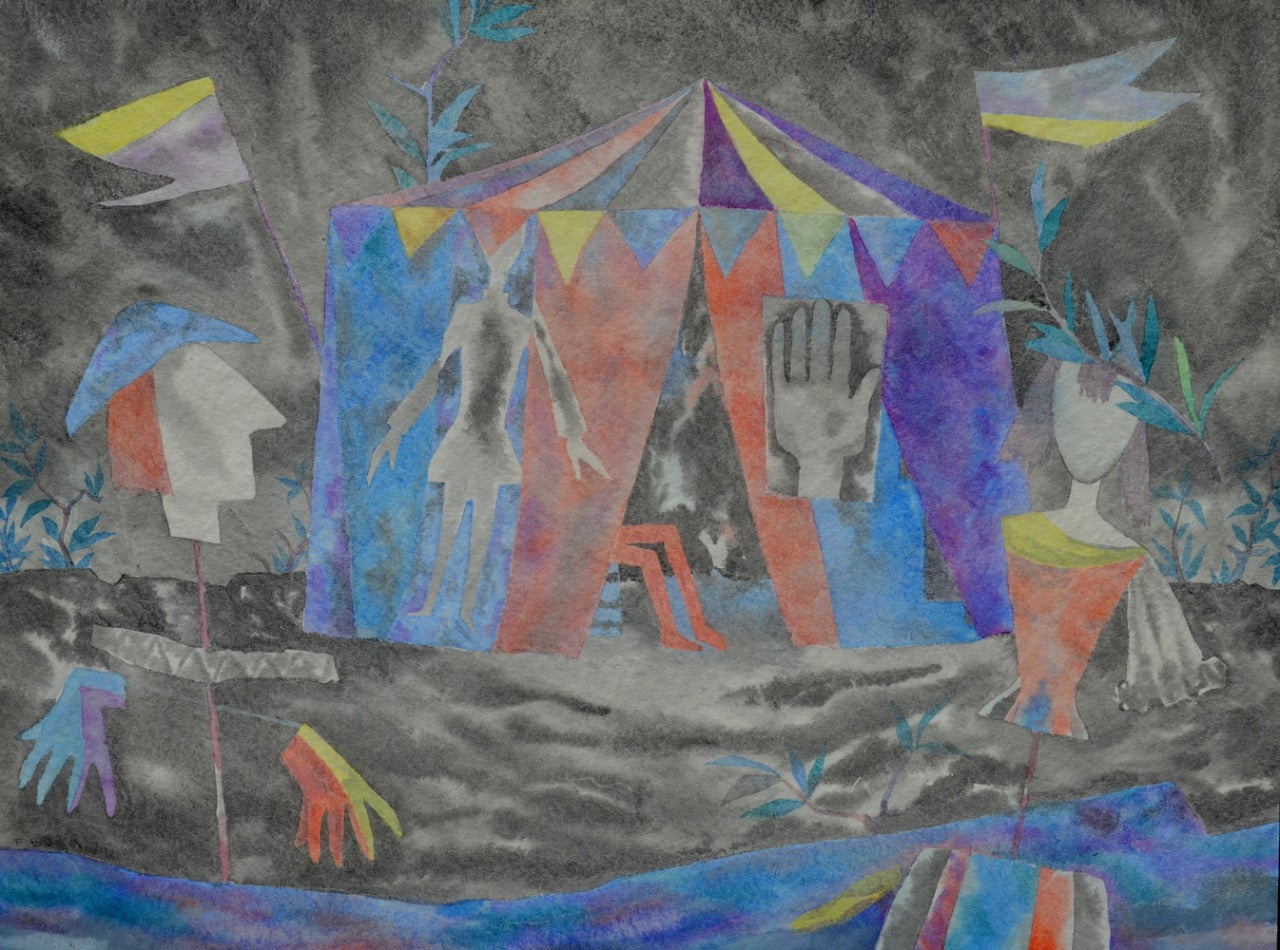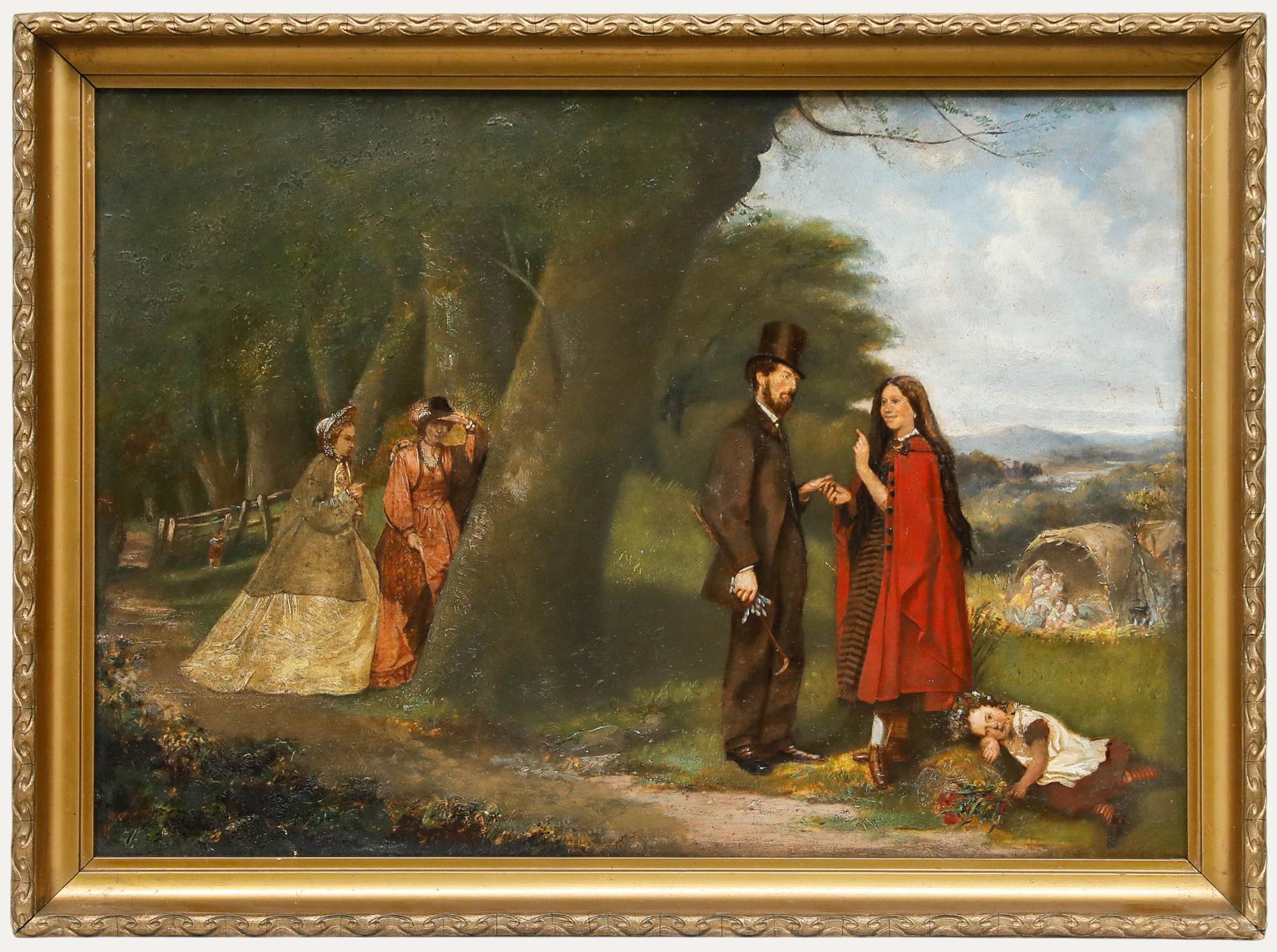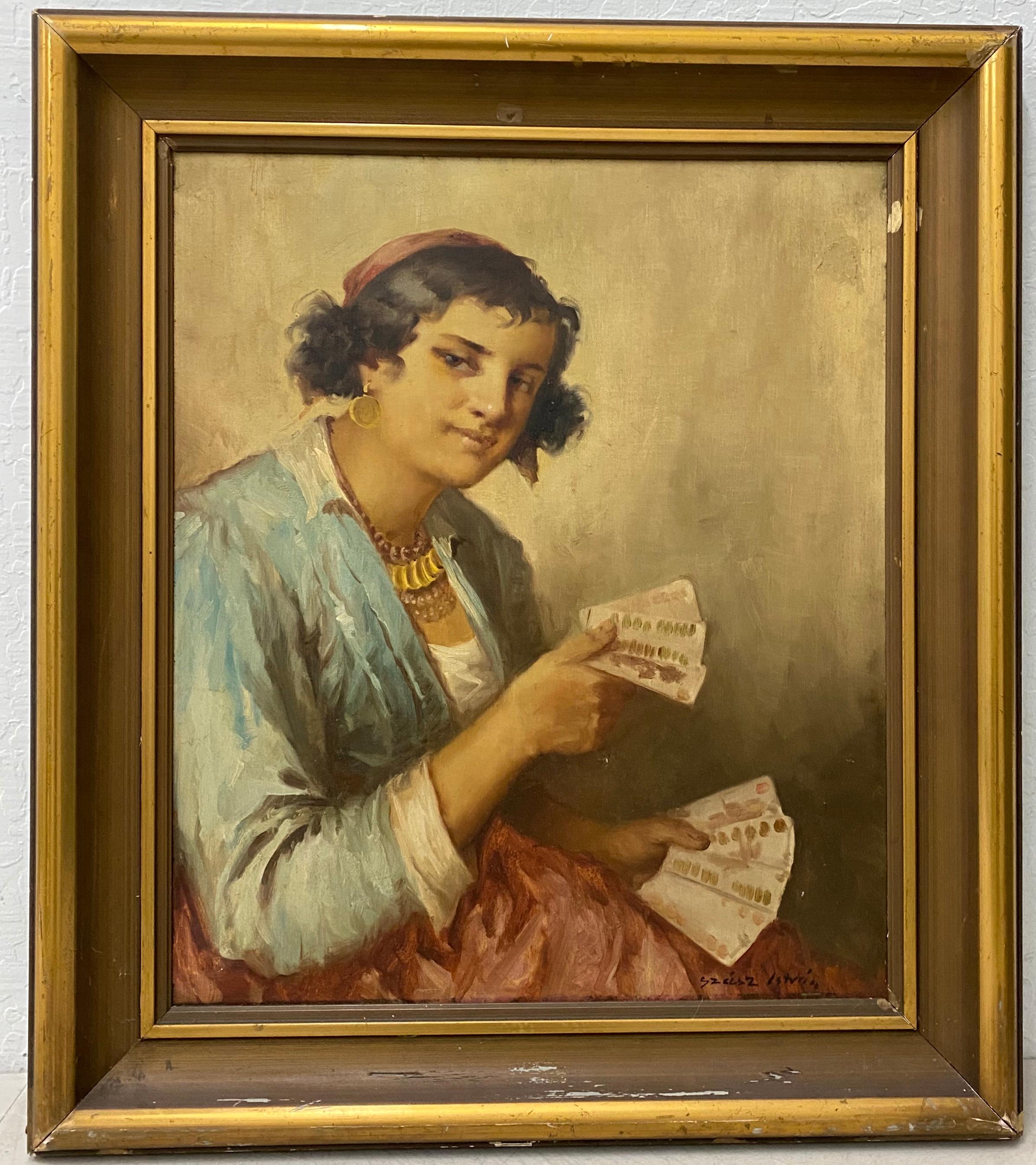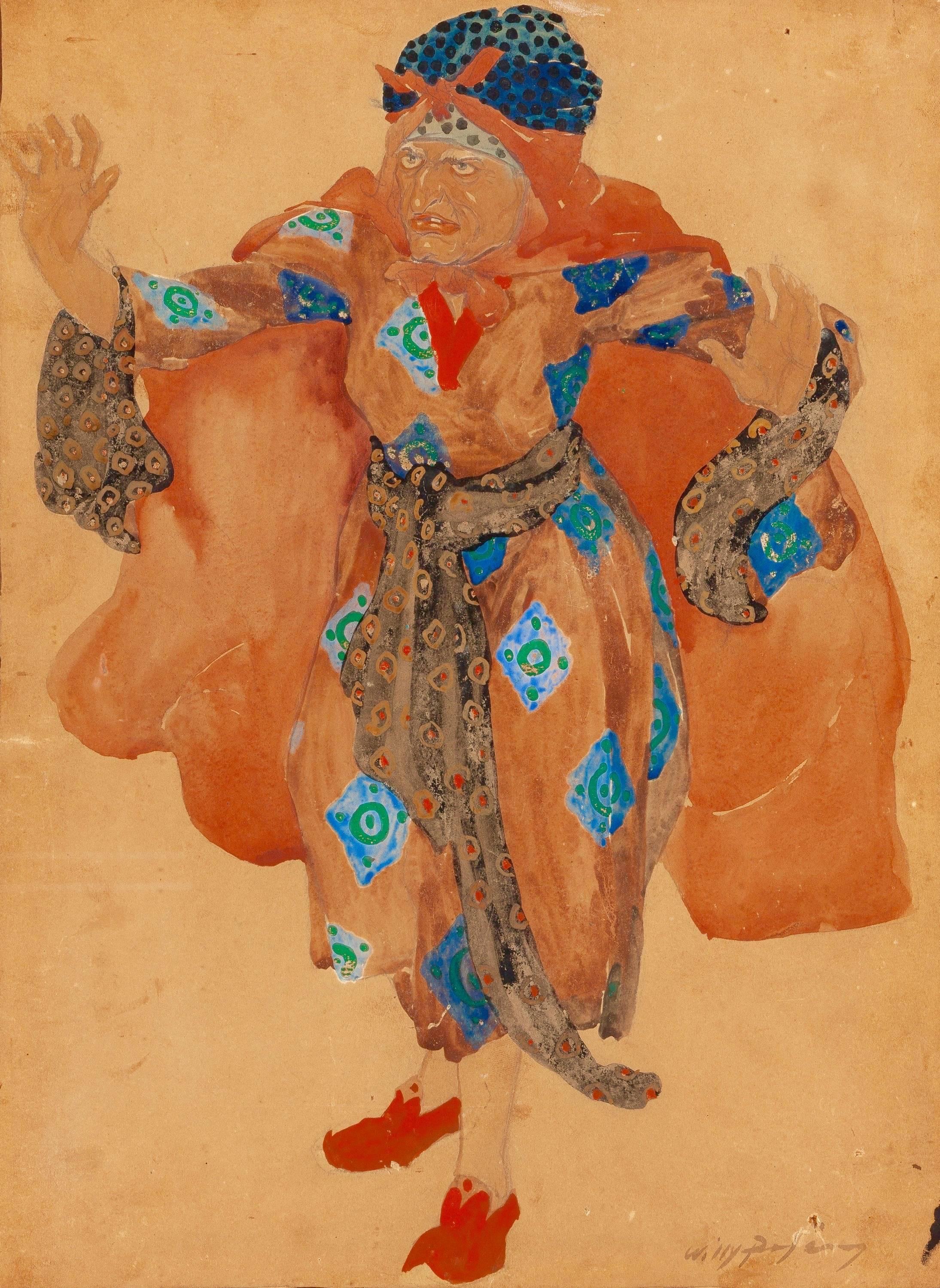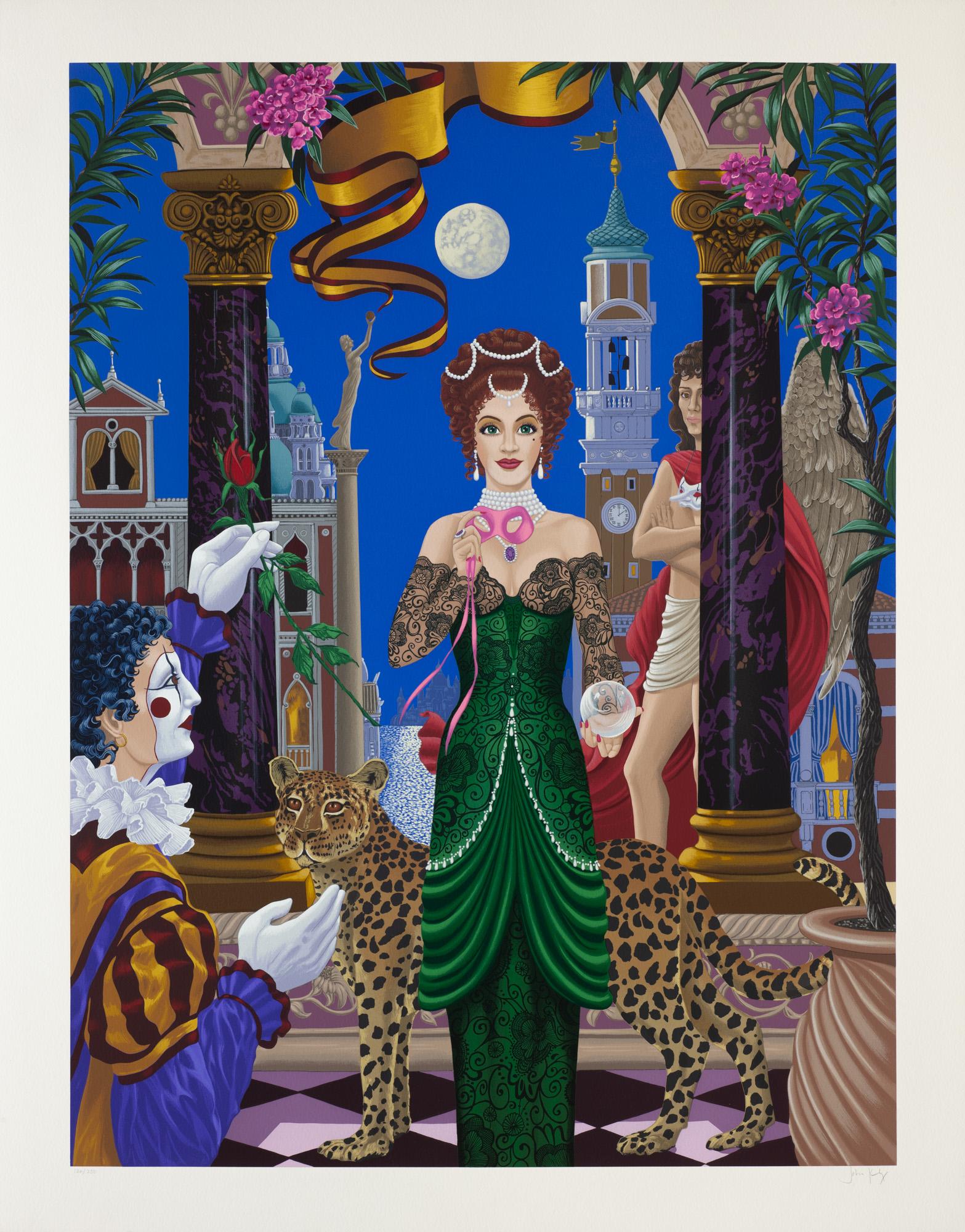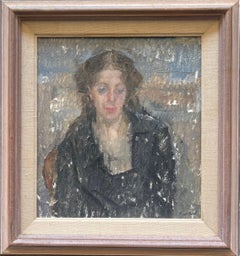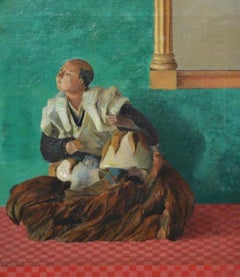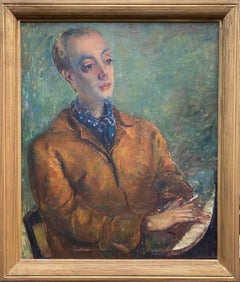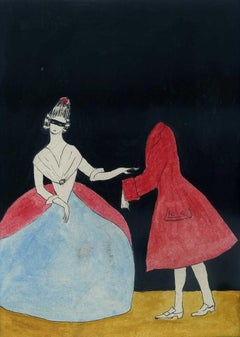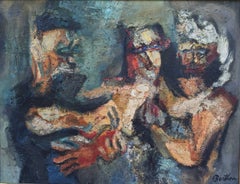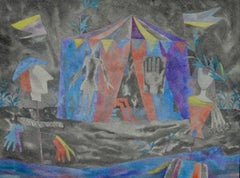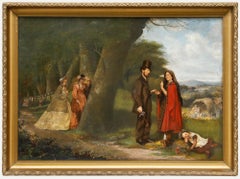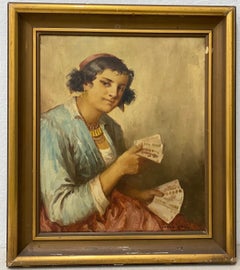Want more images or videos?
Request additional images or videos from the seller
1 of 6
Herbert Ashwin BuddThe Fortune Teller
$11,895.17
£8,572
€10,057.80
CA$16,245.29
A$16,934.44
CHF 9,225.28
MX$205,254.28
NOK 115,074.26
SEK 107,094.86
DKK 75,123.05
About the Item
Herbert Ashwin Budd
The Fortune Teller
1881-1950
Oil on canvas, signed 'H.A Budd' lower right
Image size: 18 ½ x 14 ¾ inches (47 x 37.5cm)
Original frame
Rendered in an almost autumnal colour palette with Darnley Fine Art, Budd’s oil painting depicts a Romani Gypsy engaging in the practice of fortune-telling whilst an enraptured crowd watches on. Clasped in the fortune-teller’s hand is a crystal ball, whilst behind him is a wall on which a deck of cards is pinned. Crystallomancy and cartomancy are two ways in which fortunes have historically been told, and are two practices particularly associated with Roma communities.In communities where Romani people have historically been confined to the periphery, fortune-telling - or dukkering, as it is called in the Romani language - provided an opportunity to earn money whilst practicing their own culture.
Budd was known for his paintings depicting scenes of life from London, so it is likely that the setting of this painting is an anonymous London street. It is easy to see a continuity between the performer depicted in this work from the early 20th century, and the variety of magicians and acrobats enticing crowds in today’s world.
Herbert Ashwin Budd
Herbert Ashwin Budd was born in Staffordshire in 1881. In his twenties, he was an apprentice lithographer at Allbut & Stanley, and was eventually elected a member of the Amalgamated Society of Lithographic Artists in 1901. Between 1903 and 1907, Budd studied at the Hanley School of Art before winning a scholarship to study at South Kensington’s Royal College of Art.
Budd was an Associate of the Royal College of Arts and a member of the Royal Institute of Oil Painters. His works were exhibited at the Royal Academy, the New English Art Club, and the Ipswich Art Club - he was also given an Honourable Mention at the 1927 Paris Salon. In the 1930s, he worked for London Transport and designed their travel posters, whilst also teaching at St Martin’s School of Art until 1949.Herbert Ashwin Budd passed away in 1950, leaving behind a wonderful artistic legacy with his striking oil paintings of London scenes. His works are now displayed in the collections of the Imperial War Museum, City of London Corporation, Potteries Museum & Art Gallery, and the Royal Society of Chemistry amongst others.
- Creator:Herbert Ashwin Budd (1881 - 1950, British)
- Dimensions:Height: 18.5 in (46.99 cm)Width: 14.34 in (36.43 cm)
- Medium:
- Movement & Style:
- Period:
- Condition:
- Gallery Location:London, GB
- Reference Number:1stDibs: LU52415964652
About the Seller
5.0
Vetted Professional Seller
Every seller passes strict standards for authenticity and reliability
Established in 2007
1stDibs seller since 2014
88 sales on 1stDibs
Typical response time: 2 hours
- ShippingRetrieving quote...Shipping from: London, United Kingdom
- Return Policy
More From This Seller
View AllPortrait of the Artist's Wife
By Peter Kuhfeld
Located in London, GB
Peter Kuhfeld
Portrait of the Artist's Wife
b. 1952
Oil on board, signed lower right, titled 'Cathryn' and dated 'Oct 1983' verso
Image size: 12 1/2 x 11 1/2 (32 x 29.3 cm)
Original...
Category
20th Century Portrait Paintings
Materials
Oil, Board
Figurine, 20th Century Oil on Board Signed Painting, Contemporary Frame
Located in London, GB
Mayer
20th Century
Figurine
Oil on board, signed lower right
Image size: 16 x 13 inches
Contemporary frame
Category
20th Century Figurative Paintings
Materials
Oil, Board
Portrait of Stanley Bate, 20th Century Musician
Located in London, GB
Oil on canvas
Image size: 24 x 29 inches (61 x 73.5 cm)
Contemporary style gilt frame
Provenance
From the estate of the artist, Clara Klinghoffer
This portrait is by an artist who propelled rapidly into the limelight after her first solo exhibition in 1920, at the age of 19, with the Daily Graphic naming her as the 'Girl Who Draws Like Raphael'. Yet today Clara Klinghoffer's name is little know.
Klinghoffer's early success resulted in numerous portrait commissions, including this one of the English composer Stanley Bate. The bold use of colour and naive execution of this portrait clearly reveals the modernist influence of fellow Jewish artists such as Bernard Meninsky, Jacob Kramer and Mark Gertler...
Category
20th Century Modern Portrait Paintings
Materials
Canvas, Oil
The Charming Ghost
Located in London, GB
Ink and watercolour
Image size: 3 3/4 x 5 3/4 inches (9.5 x 14.5 cm)
Contemporary frame
Provenance
Private family collection
This painting was created in the early 1900's when the Decadent Movement...
Category
Early 1900s Aesthetic Movement Figurative Paintings
Materials
Ink, Watercolor
An Irish Rogue
Located in London, GB
Oil on board, signed and dated '44 lower right
Image size: 15 x 19 inches (38 x 48.25 cm)
Contemporary style hand made frame
This portrait of an unknown man certainly captures the personality of the chosen sitter. With hat tilted to the side, eyebrow lifted and a half smile of the man's face, one gets the impression that he is finding the whole process of having his portrait painted rather amusing.
Still in Ireland at this time, the sitter is likely to have been a friend of the artist, from Belfast.
In 1944 there was a group exhibition in Belfast held at the textile business of William Ewart & Sons on Bedford Street. Here Smith showed his works alongside the artists Colin Middleton...
Category
1940s Modern Portrait Paintings
Materials
Oil, Board
The Letter
Located in London, GB
Charles Stuart Forbes
The Letter
1865-1926
Oil on canvas, signed and dated '1916' top right
Image size: 29 1/2 x 68 3/4 inches (74.8 x 174.9 cm)
Original frame
This painting depicts...
Category
20th Century Paintings
Materials
Canvas, Oil
You May Also Like
The Fortune Teller
By Roland Berthon
Located in Southampton, NY
Oil on canvas painting done in heavy impasto paint. Signed lower right. Has 2 patches that are much bigger than actual holes. Each repair is half the size of a dime and is not visible from the front of the painting. Original bill of sale from the Gallerie Ferrero in Geneve comes with the painting. Titled in French verso "La Cartomancienne" which translates to the fortune teller...
Category
1960s Abstract Expressionist Figurative Paintings
Materials
Canvas, Oil
$2,800 Sale Price
20% Off
The Fortune Teller
By Franz Bergmann
Located in West Hollywood, CA
Presenting an exceptional mixed media watercolor by Austrian/American artist Franz Bergmann.
Bergmann studied at the Academy of Fine Arts in Vienna, before settling in Northern California in the mid 1930s where he worked and taught until his death in 1970.
The Fortune Teller...
Category
1940s Figurative Paintings
Materials
Mixed Media
Price Upon Request
19th Century Oil - The Fortune Teller
Located in Corsham, GB
A charming oil study depicting a gentleman stopping at a gypsy encampment to have his palm read by a fortune teller. Hiding behind a tree, two ladies strain to hear the conversation....
Category
19th Century Figurative Paintings
Materials
Oil
Istvan Szasz "Fortune Teller" Original Oil Painting C.1930
Located in San Francisco, CA
Istvan Szasz "Fortune Teller" Original Oil Painting c.1930
Original oil on canvas. Dimensions 20" wide x 23.25" high
The frame measures 26" wide x 29.5"...
Category
Early 20th Century Impressionist Portrait Paintings
Materials
Canvas, Oil
Fortune Teller
By Willy Pogany
Located in Fort Washington, PA
William Andrew (Willy) Pogany was a native of Hungary and his first studies in Budapest and Paris were in engineering. Success in caricaturing led him to pursue and art career, first in London and then in America. His influences were the Oriental artists and illuminated books, and much of his career was devoted to book illustration.
Among his many successes were The Rubaiyat, The Kasidah, The Children’s Book of Northern Myths, The Witch’s Kitchen, The Frenzied Prince, Sonnets from the Portuguese, Fairy Flowers, Forty-Four Turkish Fairy Tales, Tales of the Persian Genii, A Treasury of Verse for Little Children, Stories to Tell the Littlest Ones, Hungarian Fairy Book...
Category
20th Century Other Art Style Paintings
Materials
Paper, Pencil, Watercolor
Fortune Teller
Located in Greenwich, CT
"Fortune Teller" is a serigraph on paper by the artist John Kiraly, signed 'John Kiraly' lower right and numbered 126/250 lower left. The image size is 36.5 x 27.25 inches and the fr...
Category
20th Century Contemporary Prints and Multiples
Materials
Paper, Screen
$1,005 Sale Price
40% Off
More Ways To Browse
Vintage Kensington
Deck Of Cards
Herbert Oil
Oil Paintings Of London
Deck Of Cards Vintage
Fortune Teller
Oil Painting Still Life With Apples
20th Century Dutch Oil Paintings
Dutch School
Little Girl
Painting Resting
Chicago Painting
Impressionist Garden Paintings
Contemporary Oil Painting Young Man
19th Century Rural Scene Painting
Nudes Large
Oil Painting On Wood 1940
Landscape Paintings Evening

